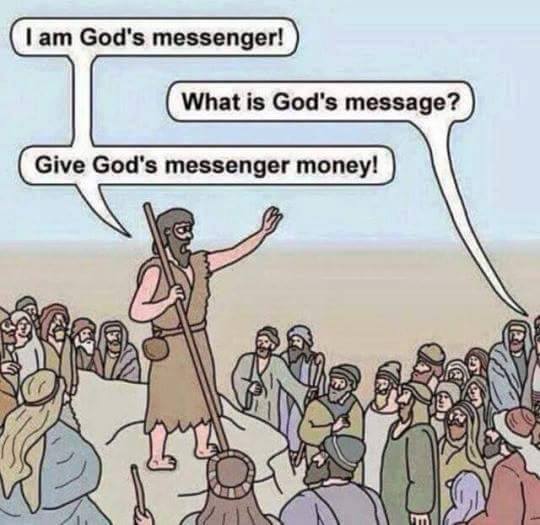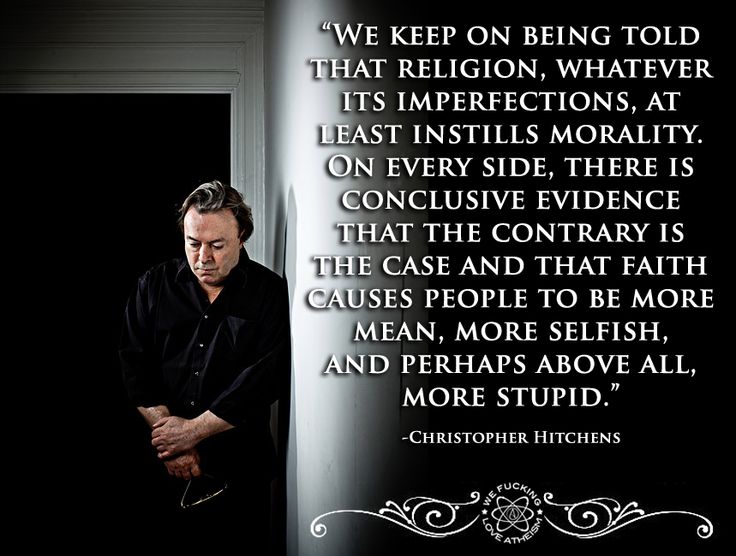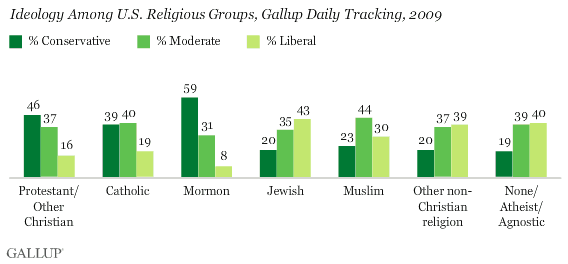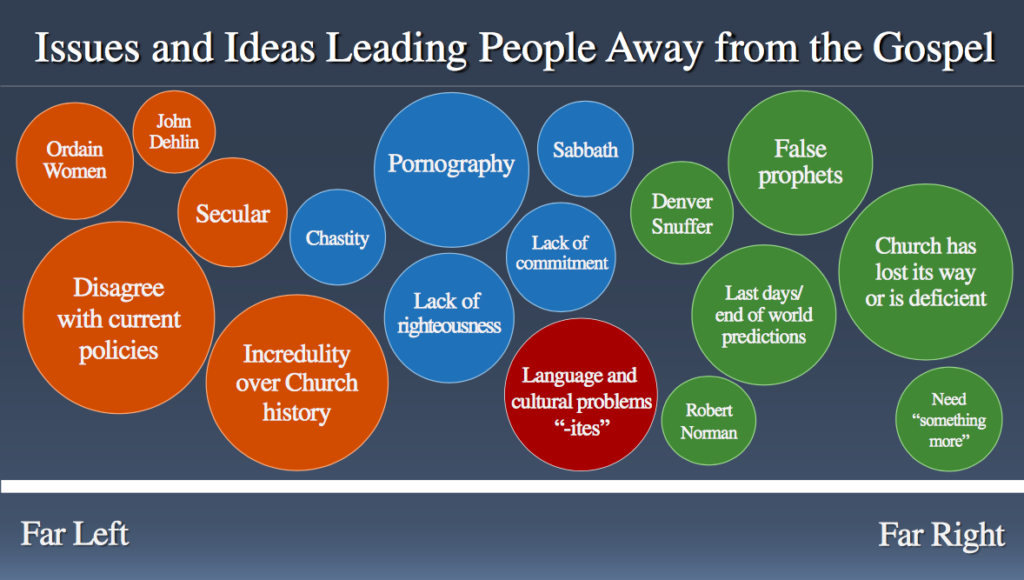The Law of Consecration
Reading assignment
Doctrine and Covenants 42:30–42; 51; 78; 82; 104:11–18;
Our Heritage, page 26.
Links: Teacher’s manual | Student manual
Overview
Ah, the days when I could get a rise out of a Sunday School class by cheekily suggesting that the Law of Consecration (aka the United Order) was a form of socialism.
“Socialism is Satan’s counterfeit for the United Order!” Brother Grumpus would always say. The classfull of Mormon-Americans would nod along. They probably didn’t understand socialism (or communism), and they sure didn’t understand the United Order, but I doubt they would have been thrilled with any of these systems. So it’s funny that this lesson tries to sell communitarian utopianism to what is very likely to be a very conservative class of members.
The Law of Consecration is not communism or socialism. It is, however, the mark of an incredibly demanding religion. Briefly, it is an economic system in which members place all their property and worldly goods into the hands of the same church leaders who ask if they masturbate.
It is the system that the Lord has ordained for looking after the welfare of his Saints… and it is something that always fails. It never works, but God doesn’t seem to know this.
There is, however, something that does seem to be working where it’s been tried so far: Universal Basic Income. I’ll plug that a bit later on.
Reading
How it started
The chapters for this lesson are revelations from the creator of the universe, and definitely not Joseph Smith, in which people are told to give Joseph Smith their money. Edward Partridge was supposed to work it out.
D&C 51:3 Wherefore, let my servant Edward Partridge, and those whom he has chosen, in whom I am well pleased, appoint unto this people their portions, every man equal according to his family, according to his circumstances and his wants and needs.
4 And let my servant Edward Partridge, when he shall appoint a man his portion, give unto him a writing that shall secure unto him his portion, that he shall hold it, even this right and this inheritance in the church, until he transgresses and is not accounted worthy by the voice of the church, according to the laws and covenants of the church, to belong to the church.
Here’s God giving poor deluded Martin Harris the business…
D&C 104:24 And again, let my servant Martin Harris have appointed unto him, for his stewardship, the lot of land which my servant John Johnson obtained in exchange for his former inheritance, for him and his seed after him;
25 And inasmuch as he is faithful, I will multiply blessings upon him and his seed after him.
26 And let my servant Martin Harris devote his moneys for the proclaiming of my words, according as my servant Joseph Smith, Jun., shall direct.
and again…
D&C 58:35 It is wisdom in me that my servant Martin Harris should be an example unto the church, in laying his moneys before the bishop of the church.
36 And also, this is a law unto every man that cometh unto this land to receive an inheritance; and he shall do with his moneys according as the law directs.
37 And it is wisdom also that there should be lands purchased in Independence, for the place of the storehouse, and also for the house of the printing.
38 And other directions concerning my servant Martin Harris shall be given him of the Spirit, that he may receive his inheritance as seemeth him good;
…while calling Martin sinful at the same time!
D&C 58:39 And let him repent of his sins, for he seeketh the praise of the world.
Joseph Smith was really something, wasn’t he?

I want to recommend Mithyn’s Law of Consecration Timeline, with loads of information about how it all went down. Mithryn’s breakdown of this lesson is also required reading. It explains the failures of 1830s-era consecration, but also of Brigham Young’s attempts in the 1850s.
This arrangement was supposed to be permanent.
D&C 78:3 For verily I say unto you, the time has come, and is now at hand; and behold, and lo, it must needs be that there be an organization of my people, in regulating and establishing the affairs of the storehouse for the poor of my people, both in this place and in the land of Zion
4 For a permanent and everlasting establishment and order unto my church, to advance the cause, which ye have espoused, to the salvation of man, and to the glory of your Father who is in heaven;
5 That you may be equal in the bonds of heavenly things, yea, and earthly things also, for the obtaining of heavenly things.
6 For if ye are not equal in earthly things ye cannot be equal in obtaining heavenly things;
And despite the Law of Consecration being discontinued, the manual says it hasn’t changed.
Explain that the principles of the law of consecration have not changed since it was revealed through the Prophet Joseph Smith. However, the application of those principles changes from time to time. The current prophet helps us understand how to apply these principles in our day.
Obviously, it’s one of those “policy changes” rather than a “doctrinal change”.
So what really happened? Why did consecration fail? Predictably, the Gospel Doctrine manual blames the people, because God never fails, and if his plans don’t work, it’s because you were bad. (Just ask Eve.)
Some Saints lived it well, to the blessing of themselves and others, but other members failed to rise above selfish desires, causing the eventual withdrawal of the law from the Church. In 1838 the Lord revealed the law of tithing (see D&C 119), which continues today as the financial law of the Church.
In other words, God had to call it off because he didn’t realise that people were going to be selfish and mean. He just didn’t see that coming. Consecration was the victim of nothing more than God’s failure to grasp human nature.
Think about it: Joseph Smith had God himself giving detailed instructions on how to make it work, and it still failed? God could knock up a universe in six days, but it seems that figuring out an economic system that works was too hard. Which makes one conclude that God is a bit of a loser. Or consecration never works. Or both.
There’s another possibility: God is a really good engineer, but a really shitty economist. His all-knowingness only extends to certain areas. Which makes sense because he isn’t that great at other things, like moral reasoning. Many times, I’ve asked religious people, “Just because God is smart enough to make a universe, why does that make him a moral expert? Why would that mean that he gets to tell us how to live?” It always confuses them, because they’re not used to thinking that someone who’s good at one thing isn’t automatically good at everything.
The response you can expect from members is “Just wait until God is in charge of it, though. Then it will work.” But this makes no sense. In what way was God not in charge of it the first time? He was dictating entire sections of the D&C, explaining who should do what, and it still didn’t work. How will next time be any different? At some point the buck has to stop.
What are class members supposed to take away from this?
What else? Give the church everything.
We must be willing to make the sacrifices that the Lord requires of us at the present time. These include sacrifices of time, talents, and possessions. The First Presidency and Quorum of the Twelve give us direction regarding how we implement the principles of the law of consecration in our day.
• How can we consecrate our time, talents, and possessions to help build the kingdom of God today? (Answers may include those listed below.)
a. Pay tithing and fast offerings and give generously in other ways to those in need. By doing these things, we can help the Church care for the poor and carry on the important activities necessary to build the kingdom of God on earth. Elder Marion G. Romney asked: “What prohibits us from giving as much in fast offerings as we would have given in surpluses under the United Order? Nothing but our own limitations” (in Conference Report, Apr. 1966, 100; or Improvement Era, June 1966, 537).
b. Serve willingly in the Church. The Lord has admonished each person to “learn his duty, and to act in the office in which he is appointed, in all diligence” (D&C 107:99). We should fulfill the callings we receive to the best of our ability. In addition to specific Church callings, we can share the gospel with others, do temple work, and seek to strengthen the testimonies of those who are new or weak in the faith.
c. Serve as a full-time missionary. Elder Robert D. Hales of the Quorum of the Twelve taught: “Going on a mission teaches you to live the law of consecration. It may be the only time in your life when you can give to the Lord all your time, talents, and resources. In return, the Lord will bless you with His Spirit to be with you. He will be close to you and strengthen you” (in Conference Report, Apr. 1996, 50; or Ensign, May 1996, 36).
God: Oh, did I say consecration? I meant fast offerings and going on missions.
It’s worth pointing out that, in the endowment ceremony, members promise to give everything they have to the church — and note: to the church! not to God. Once you’ve promised that, they own you.
And while the purpose of the United Order was ostensibly to care for the poor, getting members to hand over everything was a far more useful goal. After that, what else would you hold back from them? And if the whole enterprise fails, the investment fallacy makes you incapable of admitting that it failed.
George Carlin knew what was up.
What works: UBI
There is a way to make sure everyone has enough, and it seems to work: the Universal Basic Income, or UBI.
Universal Basic Income is a well–known topic these days, so skip this part if you’re a fan, and read on if you’re not.
Many people worry about the rise of automation displacing jobs. In the past, this hasn’t been a problem because computers have created entire industries to replace the jobs they supplanted. However, with the new wave of driverless cars, robotic automation, and (crucially) AI systems that can do human jobs just as well as a human, there’s no reason to think that there will be a robot technician for every robot. That means a lot of less-skilled workers out of work.
This is all happening at a time when neoliberalism has funnelled a lot of money toward the top 1%, and shrunk the middle class. A lot of people are just not seeing a way out of their money problems, and this is fuelling hopelessness and extremism.
One solution that has been proposed (and tested) is a Universal Basic Income, or UBI. Everyone, no matter how much money they make, gets enough money to live on, and they can work more if they want to. With a bedrock level of economic security, they can make choices:
- Leave a job they hate
- Start a business they’ve always wanted to
- Take care of kids, or someone who’s sick or elderly
- Not have to do something terrible for little to no money because they have few other choices
With a UBI, people who are doing unpaid but necessary work will be compensated. If we want people to fill unpleasant or distasteful jobs, we’ll need to pay people at a commensurate level. Don’t like porn or sex work? Fewer people will be doing it for the money; you’ll only see the people whose hearts are in it. And people who are still in truly unsavoury careers, like marketing, will be exposed for the kind of people they are.
But with the basics of life taken care of (and how about a national health care system in place), people will be able to get on with things they’d like to do. And there will be a not incidental amount of money rocketing around the economy, increasing the velocity of money, and stimulating demand.
Religious folk will object. There’s an unhelpful protestant ethic that you should starve if you’re not feeding the employment machine.
GOP lawmaker: The Bible says ‘if a man will not work, he shall not eat’
One lawmaker is citing a godly reference to justify changes to the Supplemental Nutrition Assistance Program: Rep. Jodey Arrington (R-Tex.) recently quoted the New Testament to question the strength of current work requirements.
The biblical passage, 2 Thessalonians 3-10, was a rebuttal to one of the hearing’s expert witnesses, a representative of the Jewish anti-hunger group MAZON. (He referenced Leviticus.) It is also a familiar refrain to anyone who has watched past debates about SNAP.
House Republicans have historically cited the verse — “if a man will not work, he shall not eat” — as justification for cutting some adults’ SNAP benefits.
But this is just part of another bible-based system created by a do-nothing god that hasn’t worked. Why listen to him? He did a week’s worth of work ages ago, and hasn’t done a damn thing since, except write a couple of books.
Additional ideas for teaching
Why are Mormons so blasted conservative?
I’ll be straight with you. If you’re a Gospel Doctrine teacher in a politically conservative area, this lesson is a hard sell. And there are a lot of conservative areas, because Mormons by and large are not the most liberal people. Far from it.
Mormons Most Conservative Major Religious Group in U.S.
PRINCETON, NJ — Members of the Church of Jesus Christ of Latter-day Saints, or Mormons, are the most conservative major religious group in the country, with 59% identifying as conservative, 31% as moderate, and 8% as liberal.
This is likely getting worse, as liberal members are driven out by the anti-LGBT leanings of the church’s policy makers.
Although batshit conservative John-Birchy members are also leaving, so maybe a bit of a wash. The leaked graphic from Mormonleaks — the one that prompted a takedown notice from the church — identifies threats from the “far left” and the “far right”. Denver Snuffer sits opposite John Dehlin. (Who is Robert Norman?)
Wait, where’s the bubble that says “Church is heavily compromised by its refusal to provide evidence for its claims or come clean about problematic areas of its history, plus it is untrue”? Guess they didn’t have room.
This next part is going to sound dumb. I’m sorry in advance.
For me, the conservative nature of the church was part of my deconversion. Specifically, it was when George W. Bush was re-elected to president in 2004 — county for county in the case of Utah.
I don’t mean that Mormons didn’t vote the way I wanted to, so they must be evil. There’s a lot of scope for political difference, and who knows where our political values come from anyway.
But that was the capper on a long lifetime of confrontation with Mormons, as some of the worst people in the American experiment. We live in a time when some really unapologetically evil people are in charge, and Mormons — the people who claim to have the greatest unfiltered access to the Holy Ghost — are the biggest defenders of the evil.
And yes, I do mean evil. If being evil means causing unnecessary suffering, then throwing people off their health care is a form of evil. Cutting off school lunch programmes so kids don’t get fed is a form of evil. Making sure wealthy people get enough while everyone else doesn’t is a form of evil. At some point, making sure people have enough stops being a political issue, and instead becomes a test of moral rectitude. It’s about whether you’re a Good Person, whether you give in to fascism, or whether you’re willing to turn in your neighbours on a registry.
And now that I seem to be talking about Trump, Mormons — after an initial period of uncertainty, after which they voted for him en masse anyway — think he’s just dandy.
Majority of Utahns now view Trump favorably, poll shows
Washington • President Donald Trump’s approval rating is increasing in Utah — a majority of registered voters now view him positively — even as his numbers nationally have sunk in his first two months in office.
A Salt Lake Tribune-Hinckley Institute of Politics poll finds that 54 percent of registered voters say they somewhat or strongly approve of Trump’s job performance while 41 percent disapprove. In January, just before Trump took office, a Tribune-Hinckley Institute poll found 46 percent favorability for the incoming president and 52 percent unfavorable.
Does that sound like a group of people that have the Holy Ghost? Or are they willing to overlook a pussy-grabber when he does what they like?

Maybe there’s hope. I went to visit my TBM sister before the 2016 election. She confided that she wasn’t keen on Trump. Didn’t know why. Just didn’t like him. And I thought, Well, maybe there’s a line there that she wouldn’t cross. That election was a test for many people of what they would put up with, and a lot of people failed. At least for her there was a line.
Covetousness
There’s one thing you’re not supposed to do in this lesson, and that’s covet.
Read D&C 19:26 with class members. What warning did the Lord give to Martin Harris in this verse? Why must we overcome covetousness if we are to consecrate our lives to the Lord? How can we overcome covetous feelings?
D&C 19:26 And again, I command thee that thou shalt not covet thine own property, but impart it freely to the printing of the Book of Mormon, which contains the truth and the word of God
Wow — you’re not supposed to covet your own property. In the Old Testament, you weren’t supposed to covet someone else’s stuff, but at least you knew that for your own stuff, covet away! But apparently not. That this is part of Joseph Smith’s plan to get Martin Harris to hand over everything as part of a business scam is especially galling.
Also from the manual:
President Brigham Young said: “I am more afraid of covetousness in our Elders than I am of the hordes of hell. … All our enemies … in the world, and all hell with them marshalled against us, could not do us the injury that covetousness in the hearts of this people could do us; for it is idolatry” (in Journal of Discourses, 5:353).
I’m not going to beat the drum for capitalism — not as it exists today, that is. But it seems to be that covetousness is not really a problem when everyone’s finances are unconnected. I like my neighbour’s car. Maybe I’ll work harder or make better choices, and get one. That’s mildly positive.
Coveting is only a problem when everyone’s finances are linked. You only have to worry about someone drawing out all the money when it’s a joint account. So it seems to me that the United Order encouraged covetousness.
John Whitmer recorded that “The time has not yet come that the law can be fully established, for the disciples live scattered abroad and are not yet organized; our numbers are small and the disciples untaught, consequently they understand not the things of the kingdom.” Whitmer further noted that part of the problem was that “some of the disciples who were flattered into this Church… thought that all things were to be in common, therefore they thought to glut themselves upon the labors of others.”
In general, looking after each other is something that needs to happen, even if this isn’t the way to do it.
I like this quote from Louis C.K.
Bind the Lord
There’s an idea in this reading that I find slightly evil. It was promoted on my mission, and it doesn’t work. It led to a lot of disillusionment.
D&C 82:10 I, the Lord, am bound when ye do what I say; but when ye do not what I say, ye have no promise.
The idea is: if you’re doing what God says, he has to come through with the blessings. He’s bound. It’s a very mercantile view of spirituality.
So in theory, you could “bind the Lord” and get what you want. In the mission field, it played out like this:
- Pray and make a covenant with the Lord that you’ll do something (obey the rules) if he’ll do something (send you people to baptise).
- You do the thing.
- He doesn’t do the thing back because he doesn’t exist.
This is very confusing. Apparently the Lord wants people to join the church, but he never seems to zap people’s minds and make them want to be Mormons.
With the failure of your covenant, you now have choices:
- Be disillusioned
- Clap harder
- Blame yourself
- Reinterpret the outcome in an uplifting way
Only number 1 is unacceptable in the church, and it also happens to be the best answer.



Recent Comments